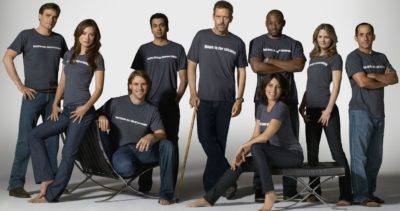It was during the research for Firmament: Machiavellian that I first realized that there was a difference between a godly character and a biblical character. The research in question was reading The Prince by Machiavelli himself. While reading, I had the epiphany that the reason Machiavelli’s ideas were so powerful was his extraordinarily accurate understanding of human nature. Yes, the book definitely shows a man whose priorities are more than a little skewed, but faulty character didn’t seem to translate to faulty ideas.
As I recently mentioned, I’ve been watching the show House, MD. And watching it has driven this point home to me all over again. On its face, it’s definitely not a Christian show. House himself is a lying, manipulative, self-centered man who cares for no one but himself and doesn’t believe in the existence of goodness or virtue. He consistently objectifies women and does outrageous things just for the purpose of annoying people. His medical ethics are downright illegal, and usually involve him playing god to a level that no one should be able to get away with. And the team he works with is, with a couple of exceptions, almost as equally debauched. They tend to be selfish, immoral, and/or serial adulterers with no moral backbone.
And yet, as I watch, I can’t shake the conviction that it’s actually one of the most biblical recent shows I’ve seen.
A godly character portrays virtue. A biblical character portrays truth. They conform to a biblical worldview which, unfortunately, includes sin and depravity. While a story that portrays evil as good is not biblical, nor is a story that portrays perfection. There is sin in the world, people are deeply flawed, and a story which exemplifies truth will show that.
So here’s what I mean when I call this selfish, immoral jerk a biblical character.
There are two things that make House a brilliant doctor. His incredible intellect, and his deep understanding of human nature. It’s not just his ability to solve puzzles, it’s his understanding of sin and motivation and how they work in a person’s life. He knows what makes us feel guilty and how that makes us react, he knows we are always looking out for ourselves, he knows that everybody lies.
But there’s another layer to this.
House scoffs at virtue and steadfastly denies any meaning to life or the world. But at the end of the day, his own life never can quite match up to his own profession. If there’s no meaning, and if connection and goodness are unnecessary evils, then the lack of meaning, connection, and goodness in his life should not make him miserable–but they do. He’s the most miserable person you’re likely to ever come across. And it’s not just him. Meaningless, casual sex leaves other characters feeling empty. Dishonesty only digs them into deeper holes. Adultery causes their lives to crumble.
Beliefs and actions have consequences.
It’s not a perfect picture, by any means. The show has no condemnation for homosexuality, bisexuality, or monogamous fornication. And while usually trumpeting the value of preserving life, a couple of episodes justify abortion in some circumstances. But overall, I’m always surprised at how accurate the morality–and immorality–is shown to be.
Perhaps most interesting are the handful of episodes that delve into religion. Most of the characters are staunch atheists, but at the end of the day, sometimes they can’t help catching a glimpse of something bigger than themselves. There is the occasional circumstance that simply cannot be explained. There are the patients, few and far between, who slap House’s worldview in the face by being truly courageous, selfless, and forgiving. And there are those poignant moments where even the most committed atheists, staring death in the face, begin to pray–because when medicine finally fails, what other hope is there?
House’s worldview of sin and debauchery may be correct–but it is incomplete. He’s put the world into a tiny selfish box that he intimately understands and can predict and work with. But sometimes–just sometimes–something comes along that doesn’t fit inside the box of human nature. Something that can only be called supernatural. And that’s when he is lost.
And until he looks outside himself and his beloved tangible, scientific facts, he always will be.
